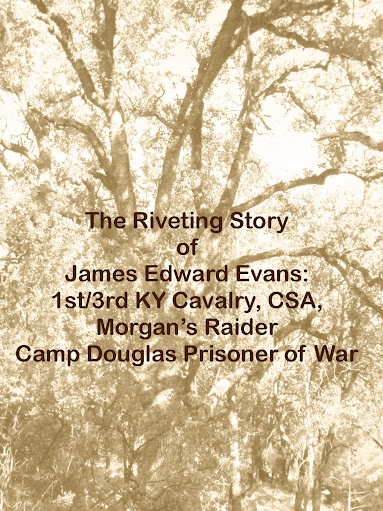“Chaplains' duties in the Civil War encompassed many areas. Most important were the worship services they conducted in tents, outdoors or around campfires. Services often were ecumenical with Catholic and Protestant chaplains sharing duties. The themes of their sermons were either patriotism to the cause, or admonitions against "evil" behavior (i.e. swearing, gambling, drunkenness and so forth). Additional duties included evening prayer meetings, prayers at dress parades and officiating at weddings, baptisms, funerals and burials. Chaplains performed pastoral functions by counseling, providing guidance and comforting the sick and wounded. They formed temperance societies and opened informal schools to teach illiterate soldiers to read and write. Among other chores assigned to chaplains were those of postmaster, writer of letters for wounded and dying soldiers, writer of letters telling of a soldier's death, banker, ambulance driver, defense counselors and Army recruiters.”[ii]
Each Union regiment was provided its own chaplain[iii]. The orginal requirements for the position specified that chaplians be "regularly ordained ministers of some Christian denomination.” The wording of the requirement was changed on 17 July 1862 to allow for the appointment of Jewish chaplains.
Regardless of their denomination, Northern Chaplains were easily recognizable as the "uniform for chaplains of the Army” was “a plain black frock coat, with standing collar, and one row of nine brass buttons; plain black pantaloons, black felt hat or army forage cap." [iv]
“August 24, 1862
This is the holy Sabbath. Today I preached to an attentive audience of about 600 persons. Many wept. There are quite a number of religious men and officers in our regiment, yet much wickedness"
~ Chaplain Stephen C. Bowers, 67th Indiana Volunteer Infantry, Co. K[v]
Conversely, only 1,308 chaplains served the Confederate army during the Civil War.[vi] While it was not required that these men be ordained, each Southern chaplain had to obtain the approval of the regimental officer before beginning their ministry. Thus, men that desired to be chaplains in the Confederate Army first preached to a specific regiment several times then met with the officers and enlisted men. In turn, it was left to the officers and enlisted men to decide if they wished to request that their commanding Colonel secure a commission for the candidate to serve as their chaplain.[vii] This proved to be a long, trying, and dysfunctional process!
As many Southern chaplains lacked adequate training and credentials, they were often viewed within disdain. Stories of unbecoming behavior abounded. Southern evangelists frowned upon drinking, dancing, swearing and gambling, yet the chaplain of Mosby’s brigade was repeated seen dancing to popular tunes of the day as well as placing bets on horse races. [viii] Another chaplain saw fit to steal a farmer’s horse as he traveled through Virginia. He justified his action saying Jesus Christ “took an ass from his owner, whereon to ride to Jerusalem.” When his crime was discovered by an officer, the officer chided, “You are not Jesus Christ, this is not an ass; you are not on your way to Jerusalem; and the sooner you restore that horse to its owner, the better it will be for you.”[ix]
Confederate chaplains had neither official uniform nor insignia and thus wore whatever suited their needs. Seeking a means to identify themselves, the chaplains of the Army of Tennessee chose a “simple Maltese cross.”[x]
Northern or Southern, the chaplain’s job was a difficult, dangerous, and low paying. It was made worse by public condemnation of their work.
The War-Christian's Thanksgiving.
Respectfully dedicated to the War-Clergy of the United States.
By S. Teackle Wallis.
Oh, God of battles! once again,
With banner, trump, and drum,
And garments in thy wine-press dyed,
To give Thee thanks we come.
No goats or bullocks garlanded,
Unto thine altars go;
With brothers' blood, by brothers shed,
Our glad libations flow,
From pest-house and from dungeon foul,
Where, maimed and torn, they die,
From gory trench and charnel-house,
Where, heap on heap, they lie.
In every groan that yields a soul,
Each shriek a heart that rends,
With every breath of tainted air,
Our homage, Lord, ascends.
We thank Thee for the sabre's gash,
The cannon's havoc wild;
We bless Thee for the widow's tears,
The want that starves her child!
We give Thee praise that Thou hast lit
The torch, and fanned the flame;
That lust and rapine hunt their prey,
Kind Father, in Thy name!
That, for the songs of idle joy
False angels sang of yore,
Thou sendest War on earth--ill-will
To men for evermore!
We know that wisdom, truth, and right
To us and ours are given;
That Thou hast clothed us with the wrath,
To do the work of heaven.
We know that plains and cities waste
Are pleasant in Thine eyes--
Thou lov'st a hearthstone desolate,
Thou lov'st a mourner's cries.
Let not our weakness fall below
The measure of Thy will,
And while the press hath wine to bleed,
Oh, tread it with us still!
Teach us to hate--as Jesus taught
Fond fools, of yore, to love;
Give us Thy vengeance as our own--
Thy pity, hide above!
Teach us to turn, with reeking hands,
The pages of Thy word,
And learn the blessed curses there,
On them that sheathe the sword.
Where'er we tread may deserts spring,
'Till none are left to slay;
And when the last red drop is shed,
We'll kneel again--and pray!
ENDNOTES
[i] U S Army Chaplain Center and School, “ A brief History of the United States Army Chaplain Corps,” Chap. 3, http://www.usachcs.army.mil/history/brief/chapter_3.htm
[ii] Melnick, Rev. John, Ob. S. A. “Chaplain John’s History of Civil War Chaplains” http://www.angelfire.com/pa5/civilwarchaplain/
[iii] Act of 3 August 1861
[iv] General Order No. 102, 1861
[v] "The Civil War Diary of Chaplain Stephen C. Bowers," ed. Glenna R. Schroeder, Indiana Magazine of History, 79, no. 2 ,June 1983, p.171
[vi] Brinsfield, John Wesley, Jr. “ The Spirit Divided: Memories of Civil War Chaplains: The Confederacy,” 2005
[vii] Robinson-Durso, Pamela. “Chaplains in the Confederate Army,” Journal of Church & State, Autumn 91, pages 747-764
[viii] Norton, Herman. “Rebel Religion. The Story of Confederate Chaplains,” page 25
[ix] Honeywell, Roy. “Struggling For Recognition, The United States Army Chaplaincy, 1791-1865” Vol. II, 1977, p. 132
[x] Pitts, Charles F. “Chaplain in Gray. The Confederate Chaplains Story,” 1957., p. 44





No comments:
Post a Comment